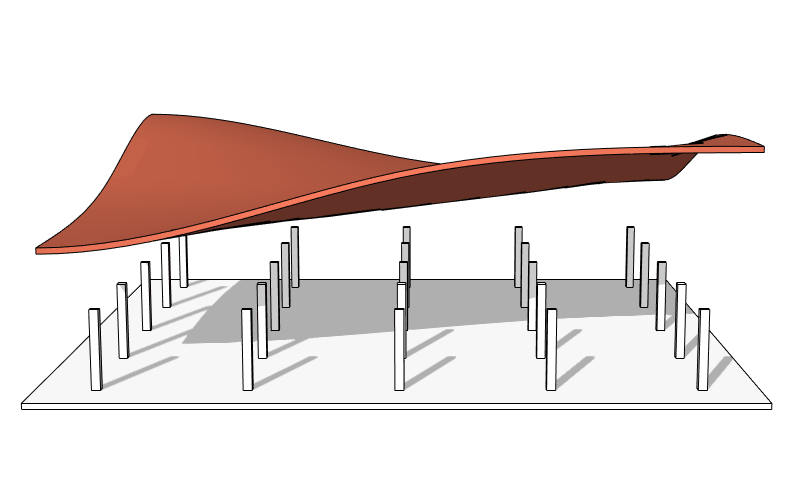Your Cart is Empty
Customer Testimonials
-
"Great customer service. The folks at Novedge were super helpful in navigating a somewhat complicated order including software upgrades and serial numbers in various stages of inactivity. They were friendly and helpful throughout the process.."
Ruben Ruckmark
"Quick & very helpful. We have been using Novedge for years and are very happy with their quick service when we need to make a purchase and excellent support resolving any issues."
Will Woodson
"Scott is the best. He reminds me about subscriptions dates, guides me in the correct direction for updates. He always responds promptly to me. He is literally the reason I continue to work with Novedge and will do so in the future."
Edward Mchugh
"Calvin Lok is “the man”. After my purchase of Sketchup 2021, he called me and provided step-by-step instructions to ease me through difficulties I was having with the setup of my new software."
Mike Borzage
An Interview with Tim Westergren, Pandora Founder and Chief Strategy Officer
October 02, 2007 6 min read

Tim Westergren is the founder and Chief Strategy Officer of Pandora. Pandora is a personalized online radio based on a sophisticated music classification system called the Music Genome Project. The idea is pretty simple from the user point of view: you start your own online radio station by selecting one song or one artist. Pandora Radio will start playing songs similar to your selection, offering you the option to "approve" or "disapprove" of each song. Over time the proposed songs align more and more with your taste and mood.
The Music Genome Project (MGP), at the core of Pandora, is the system that defines the similarity between songs. On the MGP each song is classified and ranked by human musical experts according to more than one hundred parameters or genes. The result is a continuous stream of music, from well known pieces to totally unknown and therefore enjoyably fresh songs. Be aware that Pandora can be addictive: after configuring a few Pandora radio stations you will not be able to go back to your car radio. While driving to work in the mornings, I find myself looking for the "skip" or "more like this" buttons on my car stereo.
I’m fascinated by Pandora not only for the pleasure of discovering new songs and artists, but also because I see a sophisticated and powerful technology made available (for free) in a simple, user-friendly yet effective way. I wish more hi-tech companies would take a look at Pandora and get inspired. Tim (profile) is the man behind Pandora and I had the pleasure to meet him personally and to interview him.
Tim, can you tell us a bit about yourself and your company?
I played in rock bands and I was also a composer
I’m a musician. Prior to founding this company I played in rock bands and I was also a composer for a while, so I wrote music for movies. I’ve lived in California for a long time and I was living here in California in the late ’90s when the idea for the Music Genome Project came to me largely arriving out of my own musical experiences. What I really wanted to do was create a company that would help musicians more easily find their audiences by connecting things musicological. Pandora, or the Music Genome Project which powers Pandora, was begun in the very end of 1999. We didn’t actually initially intend to launch this as a radio service — that came later — but it has become now a sort of personalized radio service.
The codification of a musical piece within the “Music Genome Project” is mostly a human (expert) based activity and therefore expensive. According to Chris Anderson’s book, in order to be a profitable long tail business, unit cost (per product) should be close to zero. How do you manage these limitations?
the only way to help people discover songs that they’ve never heard before is to understand the intrinsic qualities of that piece of music
In our world in web-casting when it comes to performance fees and royalties etc. we operate under some statutes, sort of a one-size-fits-all compulsory license and so there’s actually no difference in cost for us for streaming an icon versus a lesser well-known artist. I think that in theory what Chris said is true, if we were actually getting direct licenses from artist we could probably command a lower license fee from somebody that was less well-known and needs the exposure more. But the reality for us is that the cost, both for analyzing a song — because it takes just as much time to analyze an individual track from any artist — as well as the cost of streaming is the same, regardless of the popularity. So as for your question about how to overcome codification — our belief is that if you want good music, if you want to help people discover songs that they’ve never heard before and songs that nobody else has every gotten to know very well so there’s no kind of data around the music — the only way to do that is to understand the intrinsic qualities of that piece of music, and that’s what allows us to recommend music regardless of whether anybody knows it or not.
How would you compare the human-experts’ approach of Pandora with other selection and recommendation technologies such as the purely algorithmic or the collaborative-social?
one thing that does stand out about what we do is our ability to really pluck out music that is really unknown and effectively promote it
I think they’re just different. I don’t think scientifically you can say one is necessarily better from the other. I think the only way to really determine that is based on how listeners respond. And I think different people like different things so there are some people who much prefer to discover and explore music based on either well known critics than sort of shape makers or those who like to explore based on their peer group or other people that they consider themselves to be like are enjoying, and that’s a different approach. I think though that one thing that does stand out about what we do is our ability to really pluck out music that is really unknown and effectively promote it. I think that’s a distinct advantage of the Music Genome approach.
Do you think that the Pandora and the Music Genome Project experience could be successfully exported in some other field? Do you know anything about those companies?
there are already some companies working on the Wine Genome and the Art Genome Project
I think there are already some companies working on the Wine Genome and the Art Genome Project. I’m afraid I don’t actually know anything about those companies; they’re kind of in stealth actually. Nobody knows, I don’t know they exist, I don’t know anything about them, no.
Personally I perceive listening to a Pandora radio as a “pleasant continuous musical stimulation” opposed to the “reassuring comfort zone” of the iPod. Do you think the two approaches are complementary or alternatives?
one phenomenon that I think is common among a lot of iPod owners is iPod fatigue
I think they’re complimentary. I think that people want different things at different times. There are times when you really want to hear something specific, or when you want to hear a whole album, or you want to hear something that you know, or a playlist you’ve built. And that’s a particular frame of mind. But then there are times when I think that gets tiring. One phenomenon that I think is common among a lot of iPod owners is iPod fatigue, where they get tired of what they own and they want to learn more. I think that discovery and serendipity and a fresh supply of new music is critical for a long term love affair with music.
One of the most exciting aspects of Pandora is that it puts an extremely sophisticated and powerful system under the full control of the end user with an amazingly simple interface. Does it frustrate you, in your daily life, having to interact with great technologies by means of poorly designed and unnecessary complex interfaces?
a lot of products that are made in technology are made by people for themselves
I do think that one of the biggest problems with technology is how complex it is, and how difficult things are to use. And I think that a lot of products that are made in technology are made by people for themselves. So you know people who make music services or music playing devices often times make them in a way that they, as a really sophisticated user of technology, or a sophisticated consumer of music would like and that is not what the larger audience is prepared for. And I think that one of the real advantages of Apple is that they’ve managed to really keep things simple and elegant. That runs throughout their products and is something that it’s interesting other companies have just not been able to replicate. Simplicity is one of the hardest things to accomplish. It seems easy when you do it right but it’s very hard to get right.
Can you tell us anything about Classical Music coming to Pandora radio?
Absolutely, we’re coming up on that. We’ve been working on it for a couple of years now and we’re going to be launching it soon, so we’re very excited about that.
I would like to thank Tim Westergren for sharing his time to do this interview. If you have any questions for Tim or for Novedge, please leave a comment below and we will be glad to answer.
Franco Folini
Also in NOVEDGE Blog

Enhance Your Designs with VisualARQ 3: Effortless Geometry Extensions for Walls and Columns
April 30, 2025 8 min read
Read More
MecSoft Unveils RhinoCAM 2025 and VisualCAD/CAM 2025 with Enhanced Features
March 08, 2025 5 min read
Read MoreSubscribe
Sign up to get the latest on sales, new releases and more …



